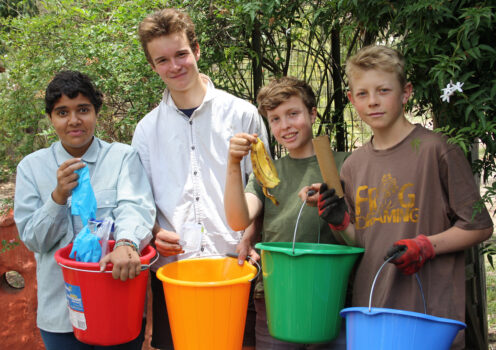 Year 7/8 from The Armidale Waldorf School recently went to the Armidale Dumaresq Recycling Centre to see what happens to waste and recycling in our town. This follows on from a rubbish audit that we conducted at the school. We sorted the bins from every classroom over 5 days, partly to see how much rubbish we generate and also to try and find a system to help with the issue of the rubbish going in the wrong bins.
Year 7/8 from The Armidale Waldorf School recently went to the Armidale Dumaresq Recycling Centre to see what happens to waste and recycling in our town. This follows on from a rubbish audit that we conducted at the school. We sorted the bins from every classroom over 5 days, partly to see how much rubbish we generate and also to try and find a system to help with the issue of the rubbish going in the wrong bins.
We were very surprised by the large amount of non-recyclable packaging our school community generates: the plastic covering of muesli bars, discarded alfoil, dirty cling wrap and the foil packets from snack crisps/noodles/biscuits, all of which, as we had discovered, are not currently recyclable at our Centre.
We discussed ways to make our school a wrapping-free zone, and to think about ways to reduce packaging. This also tied in with our unit of work – Food, Nutrition and Health – where we saw that the majority of these packaged foods are high in sugar, fat and salt and therefore not healthy on any level – for humans or the environment.
Another thing we realised is that the rate of packaging per student increased each year across the grades, which led us to try to think of ways to change this trend. We considered the perceived benefit of packaged foods and could see how they seem an easy, inexpensive and quick fix in our busy work life. Ultimately, however, our waste going to landfill is not good for us, or the earth, and mounds of landfill are not quick, easy nor inexpensive to fix. The habits developed through eating snack foods are costly to our long-term health, and so the cost to the community in the long run is expensive – so in fact not quick, inexpensive and easy.
We would like to try and help reduce the school’s rubbish each week. We are thinking of introducing small containers as bins, and see if classes can rise to the challenge of reducing rubbish each week. We have plans to make slices, and provide recipes, offer waste-free food ideas for lunch boxes, make honey wraps with classes (a beeswax cotton food wrap), perhaps organise fruit from the orchard on a regular basis for students to buy, and possibly source a range of wrap-free alternatives and containers to have available for sale at the office.
By: Joanne Lowe, Teacher
